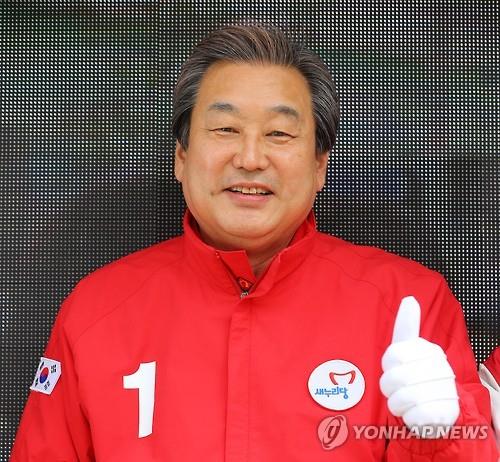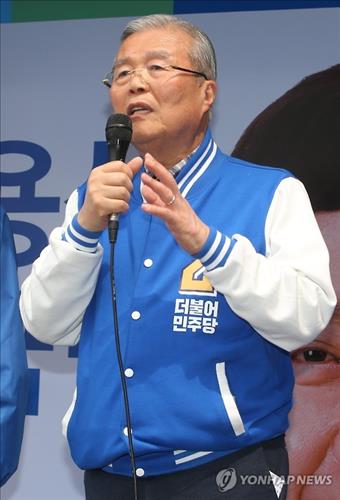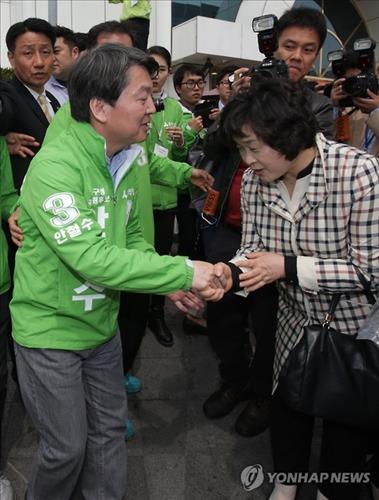- California Assembly OKs highest minimum wage in nation
- S. Korea unveils first graphic cigarette warnings
- US joins with South Korea, Japan in bid to deter North Korea
- LPGA golfer Chun In-gee finally back in action
- S. Korea won’t be top seed in final World Cup qualification round
- US men’s soccer misses 2nd straight Olympics
- US back on track in qualifying with 4-0 win over Guatemala
- High-intensity workout injuries spawn cottage industry
- CDC expands range of Zika mosquitoes into parts of Northeast
- Who knew? ‘The Walking Dead’ is helping families connect
Last-minute appeals as parliamentary races draw near

Kim Moo-sung, chairman of the ruling Saenuri Party, poses for a photo during a street rally in Suwon, just south of Seoul, on April 12, 2016.
SEOUL, (Yonhap) — The ruling and opposition parties on Tuesday made last-minute appeals for support in the capital and its surrounding areas on the final day of campaigning for the parliamentary elections.
Wednesday’s general elections are to pick a new 300-member National Assembly, with 253 of them to be selected through direct elections and the remaining 47 proportional representation seats to be allocated to parties according to the numbers of votes they receive overall.
A total of 944 candidates — 844 men and 100 women — are set to compete for the district seats. The competition rate is 3.7 to one, compared with 3.76 to one in the previous parliamentary elections in 2012, the country’s election watchdog said.
Leaders of the ruling Saenuri Party, who kicked off their 13-day campaigning period in central Seoul on March 31, made visits to Seoul and its surrounding areas Tuesday.
Up for grabs are 122 constituencies in the so-called capital city region, cited as a crucial battleground.
Chairman Kim Moo-sung traveled to Suwon, just south of Seoul, to help bolster the chances of a Saenuri party candidate there.
“The Saenuri Party’s sweeping victory is the only way to revitalize the economy and to bring hopes to the young people by creating more jobs,” Kim said during a street rally in Suwon.
He and other Saenuri leaders have accused the opposition of holding up crucial legislation that can boost the country’s economic competitiveness, in such areas as the labor market.
The latest surveys show that Saenuri will take an easy victory, although it may lose some seats in its traditional strongholds to independents who defected from the party.

Kim Chong-in, interim chairman of the main opposition Minjoo Party of Korea, speaks during a street rally in Seoul on April 12, 2016.
The Minjoo Party of Korea leadership also focused its campaigning in the areas, pleading to voters for support to keep Saenuri in check.
Kim Chong-in, after traveling to the southern resort island of Jeju, is scheduled to visit nearly 20 electorates in Seoul that are forecast to be closely contested.
“The Saenuri will grab another chance if voters pick an opposition party that is not the proper one,” Kim said during a street rally on Jeju Island, apparently warning voters not to cast their ballots for the People’s Party. Minjoo has maintained that voting for the rival opposition party is tantamount to handing victory over to Saenuri.
Kim called for the judgment of the incumbent administration’s handling of the economy, saying the government and Saenuri failed to improve the people’s livelihoods.

Ahn Cheol-soo (L), co-chairman of the splinter People’s Party, shakes hands with a supporter in the western port city of Incheon on April 12, 2016.
The People’s Party, which is likely to grab more than 20 seats on the strong backing of voters in the Honam region in the southeastern part of the country, focused its attention on Seoul.
Securing 20 seats would allow the party to form a parliamentary negotiation bloc.
Ahn Cheol-soo, the party’s co-chairman, made visits to a dozen electorates in Seoul and its surrounding area that the party believes its candidates has chances of winning. He will finish his campaign trail at his own electorate of Nowon in northern Seoul.
“Saenuri and Minjoo both failed even when they had so many opportunities,” said Ahn during a Seoul street rally.















